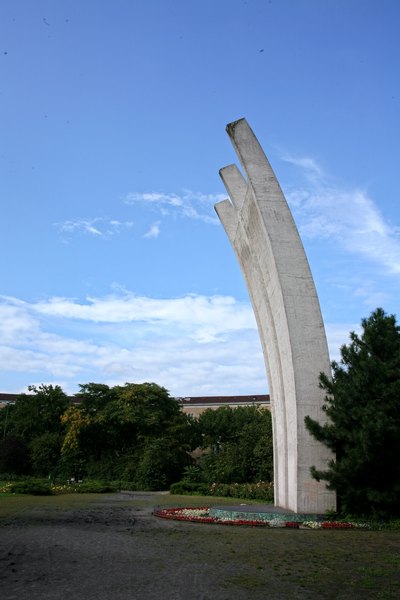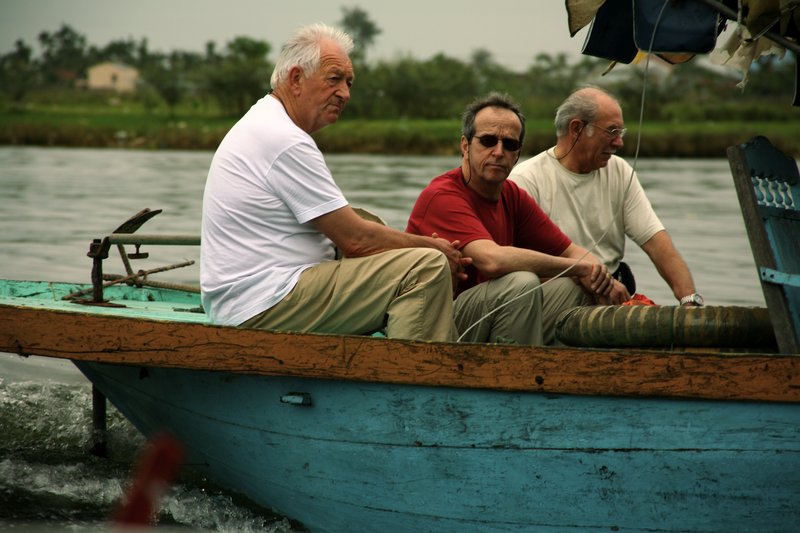
More photos and links here.

More photos and links here.
Rockets still pierce the heavens in a halo of smoke during launches, and engineers and military men still crack open bottles of vodka to celebrate a successful launch. What has changed are the passengers. Nowadays Baikonur embraces the world, from wealthy space tourists to the world’s first Malaysian cosmonaut, Sheikh Muszaphar Shukor, who blasted off for the international space station on Oct. 10.
The city itself is a rusting relic of the golden age of Russian rocketry, yet if anything, its place in the space industry is heading toward expansion. For at least four years after the space shuttle program ends in 2010, the U.S. will completely depend on Russia – and Baikonur – to send its crews to the international space station.
Facilities and equipment are workable but old. Remnants of demolished buildings and pieces of rusty metal dot the landscape along the roads to the launchpads. Dozens of apartment blocks that were abandoned after the 1991 Soviet collapse stand in rows like tombstones, their windows bricked up.
Maureen Taylor has dated a photograph to 1913 by studying the size and shape of a Lion touring car’s headlamps. Armed with her collection of 19th-century fashion magazines, she can pinpoint the brief period when Victorian women wore their bangs in tight curls rather than swept back. Using a technique borrowed from the CIA, she identified a photo of Jesse James by examining the shape of his right ear.
With millions of Americans obsessively tracing their roots, Ms. Taylor has emerged as the nation’s foremost historical photo detective. During a recent meeting of the Maine Genealogical Society, attendees lined up a dozen deep as she handled their images with a cotton glove and peered at the details through a photographer’s loupe. One man offered a portrait photo and asked if it could be of his great grandmother, who died in 1890. “It’s not,” Ms. Taylor said after about 15 seconds; she’d dated the hairstyle and billowy blouse to the early 20th century. When another attendee asked why her great-great-grandfather was wearing small hoops in his ears in a portrait, Ms. Taylor explained, “He was in the maritime trade.”
Reg Turnill was working for the BBC in 1957 when the Soviet Union launched Sputnik 1, the World’s first orbiting artifical satellite.
Turnill went on to cover the space race and travelled to the Soviet Union for the press conference following cosmonaut Yuri Gagarin’s orbital flight and eventually was based in the US to cover NASA’s Moon programme.
He got to know the German rocket engineer Werner von Braun, who had developed the Nazi V-2 weapon, and also came to know many of the US astronauts.
Video
The true story of Germany’s most famous anti-Nazi heroine is brought to thrilling life in the multi-award winning drama SOPHIE SCHOLL-THE FINAL DAYS. Academy Award nominee for Best Foreign Language Film of 2005, SOPHIE SCHOLL stars Julia Jentsch in a luminous performance as the young coed-turned-fearless activist. Armed with long-buried historical records of her incarceration, director Marc Rothemund expertly re-creates the last six days of Sophie Scholl’s life: a heart-stopping journey from arrest to interrogation, trial and sentence.
In 1943, as Hitler continues to wage war across Europe, a group of college students mount an underground resistance movement in Munich. Dedicated expressly to the downfall of the monolithic Third Reich war machine, they call themselves the White Rose. One of its few female members, Sophie Scholl is captured during a dangerous mission to distribute pamphlets on campus with her brother Hans. Unwavering in her convictions and loyalty to the White Rose, her cross-examination by the Gestapo quickly escalates into a searing test of wills as Scholl delivers a passionate call to freedom and personal responsibility that is both haunting and timeless.
Fifty years ago today, Don Mazzella skipped out of school to see the hot new car that everybody was talking about, the hot new car that almost nobody had actually seen.
Ford Motor Co. had proclaimed it “E-Day,” and Mazzella and two buddies sneaked out of East Side High School in Newark, N.J., and hiked 13 blocks to Foley Ford so they could cast their gaze upon the much-ballyhooed new car that had been kept secret from the American public until its release that day.
It was called the Edsel.
“The line was around the block,” recalls Mazzella, now 66 and an executive in a New Jersey consulting firm. “People were coming from all over to see this car. You couldn’t see it from the street. The only way you could see it was to walk into the showroom and look behind a curtain.”
Mazzella and his truant friends waited their turn, thrilled to be there. “Back then for teenagers, cars were the be-all and end-all,” he explains. They’d read countless articles about the Edsel and seen countless ads that touted it as the car of the future. But they hadn’t seen the car. Ford kept it secret, building excitement by coyly withholding it from sight, like a strip-tease dancer.

Berlin Airlift Memorial at Tempelhof Airport U-Bahn Platz der Luftbrucke 52.484141 13.387412
t was “the most generous act of any people, anytime, anywhere, to another people,” its chief administrator declared. It was “among the most noble experiences in human affairs,” its representative in Europe said. It was “the most staggering and portentous experiment in the entire history of our foreign policy,” the young Arthur Schlesinger, Jr., who served on its staff, wrote. Foreigners concurred. It was “like a lifeline to sinking men,” according to the British Foreign Secretary Ernest Bevin. It “saved us from catastrophe,” a manager at Europe’s largest tire factory declared. Sixty years after Secretary of State George C. Marshall outlined the need for economic aid to stimulate European recovery, in a speech at Harvard University’s commencement on June 5, 1947, the plan named after him continues to be fondly remembered in donor and recipient countries alike. In our own time, liberal internationalists have periodically called for new Marshall Plans. After the collapse of Communism, some economists maintained that the former Soviet Union was in need of one. More recently, there has been desultory talk of Marshall Plans for Afghanistan, Iraq, and even the West Bank and Gaza. When critics lament the allegedly modest sums currently spent by the American government on foreign aid, they often draw an unfavorable contrast with the late nineteen-forties. Yet some people, at the time of its inception and since, have questioned both the Marshall Plan’s motivation and its efficacy. Was it really so altruistic? And did it really avert a calamity
Taxpayers for Common Sense posted a very useful and in some ways surprising look at $3,000,000,000 in Congressional Earmarks attached to a $459,600,000,000 defense appropriation bill (not the entire defense budget). This amount is $40,000,000,000 more than last year’s authorization (nice). Wisconsin congressional earmarks are lead by long time incumbent David Obey with $42,000,000, who also conveniently serves as Chair of the House Appropriations Committee. Obey’s earmark methods have been criticized recently: John Solomon & Jeffrey Birnbaum writing in the Washington Post:
Democrats had complained bitterly in recent years that Republicans routinely slipped multimillion-dollar pet projects into spending bills at the end of the legislative process, preventing any chance for serious public scrutiny. Now Democrats are poised to do the same.
“I don’t give a damn if people criticize me or not,” Obey said.
Obey’s spokeswoman, Kirstin Brost, said his intention is not to keep the projects secret. Rather, she said, so many requests for spending were made to the appropriations panel — more than 30,000 this year — that its staff has been unable to study them and decide their validity.
Here’s a list of all earmarks (.xls file) attached to this defense bill. Wisconsin delegation earmarks:
HouseDefenseEarmarks.xls. Congress’s approval ratings (3%) are far below the President’s (24%), which isn’t saying much (Zogby Poll)
Much more on local earmarks, here [RSS Feed on earmarks]
 This is an interesting image, taken from a slow boat on the Thu Bon River, just south of Hoi An, during a recent trip to Vietnam.
This is an interesting image, taken from a slow boat on the Thu Bon River, just south of Hoi An, during a recent trip to Vietnam.
Australians, Americans? What might be on their minds – the War, friends, travel? Their faces seem to imply many, many words. A few more notes and links on Vietnam can be found here.
There are now an estimated 137 million internet users in China, second in number only to the United States, where estimates of the current internet population range from 165 million to 210 million. The growth rate of China’s internet user population has been outpacing that of the U.S., and China is projected to overtake the U.S. in the total number of users within a few years.
The influx of tens of millions of new online participants each year can be expected to have far-reaching consequences for the Chinese population, for China itself and for the larger world. At the very least, the internet will offer ever greater numbers of Chinese a much more sophisticated information and communications world than the one they currently inhabit. And because the Chinese share a single written language, despite the multiplicity of spoken tongues, it could have a unifying effect on the country’s widely dispersed citizenry. An expanding internet population might also increase domestic tensions that could spill over into China’s relations with the U.S. and other countries while the difference between Chinese and Western approaches to the internet could create additional sore points over human rights and problems with restrictions on non-Chinese companies.